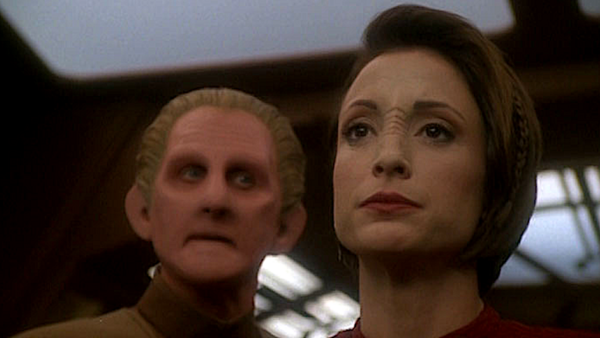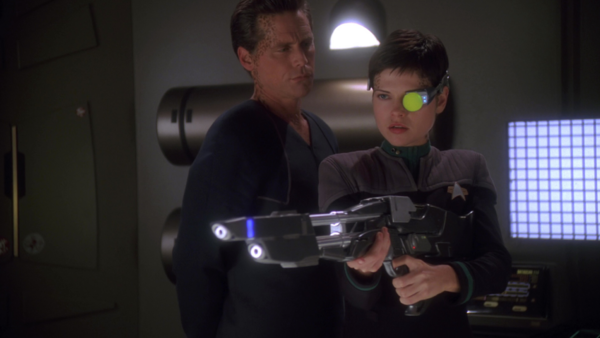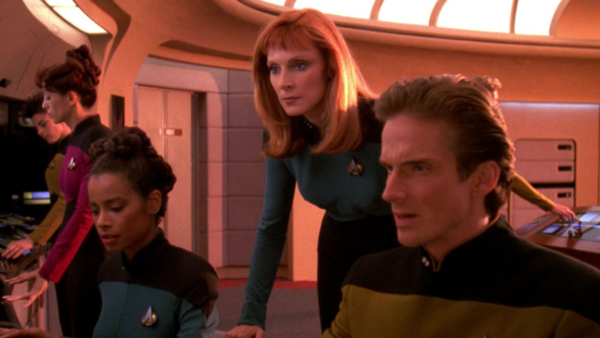Star Trek: 10 Best Episodes Showcasing Female Empowerment
Star Trek has offered us examples of true female empowerment for decades.

When we see characters coming together to overcome the odds, it's in our nature to cheer and shout. There's something so satisfying in watching any of our favourites overcome the odds, even more so when they're helping each other.
For the most part, Star Trek has attempted to show a future of equality between the sexes, though that isn't to say it's always been perfect. The Original Series made several slips that, even when viewed through a contemporary lens, belied the promise of a better future for all.
In crafting this list, Seán and Ellie worked together to find the best examples through sixty years of Star Trek.
Across the franchise, and perhaps despite the real world around it, Trek has tried to show us examples of women in positions of power, helping each other, and not having to rely on men to get the task done. It may sound like the most obvious thing in the world - but let women do their thing - they know what they're about.
10. Una And La'an Play Enterprise Bingo

Of the two characters we're discussing here, one is as old as the Star Trek universe itself. Though this entry isn't focused on The Cage, Una Chin-Riley has been with Trek since the very beginning, offering us an example of a strong woman with agency - despite some outdated ideas at the time.
La'an and Una, as we currently know them, were both introduced (and reintroduced) as harder characters in their respective debuts. On Star Trek: Discovery, Una was the no-nonsense, straight-talking first officer of the Enterprise, a role for which she returned in Strange New Worlds. La'an was something of a protegé. She was not only inspired to join Starfleet by number one but also modelled her persona on her superior officer.
Film and television offer many examples of the hardened, loner characters through history, many of whom have met with uproarious adulation from fans. Sarah Conner evolved to become one of the archetypal heroic characters in cinema, showcasing her strength in the face of purported fate. Yet Una and La'an took another route.
Without losing any of their strength, Spock Amok depicts both characters listening to descriptions of themselves and turning them on their head. For example, Una's strength earned her the nickname 'where fun goes to die.' Rather than dwell, she and La'an decide to play a game - Enterprise Bingo - that is popular among the lower decks. This culminates in a scene of their standing outside the ship on 'the scorch,' the oldest original part of the ship still intact.
Rather than being lectured to by other crewmembers, Una and La'an take on the challenge of having fun on their own terms - earning both of them a spot on this list.
9. Kira Leads The Blockade Around Derna

Deep Space Nine's seventh season opened with the two-part story Image In The Sand and Shadows And Symbols. While the station felt the absence of Captain Sisko, newly-promoted Colonel Kira Nerys was tested by the Romulans. Having agreed to the use of Bajor's fourth moon, Derna, for medical reasons, the Colonel is horrified to discover the Romulans are fortifying it.
Kira's relationship with Starfleet echoes one of the outsider looking in, although this had many times worked to mutual advantage. Here, Starfleet's allyship with the Romulans threatens Kira's position. The potential annexation of a Bajoran moon seemed at odds to Starfleet's ethos, yet they seem willing to sacrifice Bajor's sovereignty to help end this war faster.
Kira then becomes a symbol of what's right, standing up against Romulan Warbirds with a rag-tag group of Bajoran (and one Karemma, for some reason) fighters. The episode deliberately echoes the Cuban Missile Crisis, with Bajor on the back foot. It may be Romulan vessels flying towards Kira but they are supported by their Federation allies.
In the end, Kira's resolution changes Admiral Ross's mind, leading to his insistence that the Romulans back down. In the entire sequence, Kira doesn't back down, nor does she blink. The question of whether she was actually bluffing remains more than twenty years later. Bluff or no, her hand was played, and she won.
8. Deanna And Ro On The Bridge

Disaster was a bottle episode that broke the crew of the Enterprise-D into small units who were cut-off from each other. While Picard sang Frére Jacques with several schoolchildren in a turboshaft, command of the ship fell to Lieutenant Commander Deanna Troi.
Troi's rank was not a focus in The Next Generation's early years. As the ship's counsellor, she was usually on hand to support the senior staff, or lend her empathic abilities to whatever crisis the Enterprise faced that week. It would take almost five years to explore her Starfleet expertise, which they did once the ship hit that quantum filament.
Troi's exchanges with Ro have been subject to dissection through the years. On the one hand, it is a clear case of pitting female characters against each other. Though the scenes are great for Troi's growth and highlight the strength that she possesses, they're less kind to Ro. Michael Piller commented, in Captains' Logs: The Unauthorized Complete Trek Voyages, that Ro's apology at the end made her look foolish. He would have preferred that she asserted Troi could still easily have killed them all with her decisions.
Though not perfect, Disaster was one of the few examples of Troi's command presence and power in The Next Generation, which would eventually lead to her promotion in Thine Own Self.
7. Ezri Dax Hunts Chu'lak

Nicole de Boer's arrival on Deep Space Nine followed the unceremonious departure of Terry Farrell. While the behind-the-scenes politics of what went down there have since been explored, Ezri Dax was introduced as a character unsure of who, or what, she really is. Earlier DS9 episodes introduced the idea that physically joining Trill to symbionts was relatively straightforward, but what of the emotional cost?
Much of Ezri's storylines saw her attempting to keep her cool while she struggled with her newly joined status. Episodes like Afterimage and The Prodigal Daughter were designed to show her growth but it was Field Of Fire that explored her inner strength.
Recalling the spirit of former male host Joran to help her find a murderer, Ezri finds herself at odds with her colleagues, growing more and more obsessed with catching the secret killer. Though she does find him and stop him, it isn't her ability to kill him that displays her strength but rather her decision not to.
Ezri was saddled with seven seasons' worth of growth with barely twenty episodes' worth of time but in refusing Joran's urges to kill, she at least demonstrated that she had both the will and the fortitude to keep her inner struggles at bay.
6. Captain Crusher Listens To Taitt

The seventh season of The Next Generation featured Jeri Taylor serving as executive producer for the second year, while simultaneously showcasing better stories with women in the central role. Descent Part 2 picks up with Dr Crusher in command of the Enterprise-D.
Beverly had one of the more interesting, and admittedly stilted, journeys through the final frontier. TNG's first year seemed poised to have her featured at least as prominently as McCoy on The Original Series before behind-the-scenes drama saw Gates McFadden exiting the show before the second year. She returned following executive producer Maurice Hurley's departure, though the momentum of the first year had dwindled for her character.
While in command of the Enterprise, she not only saves the crew from the renegade Borg, but she also makes a point of listening to her crew, regardless of the number of space hours they have logged. Ensign Taitt's suggestions may have fallen on deaf ears were even Riker or Picard in charge. Dr Crusher had the wisdom to allow her to try her theory - a theory that ends up saving the ship.
Rather than dwell on Lieutenant Barnaby's unwillingness to hear Taitt out, the episode opts to instead show Crusher's leadership, as well as the crew's comfort and growth with her in charge. It was a clear statement in the series' final season's premiere episode - something that carried on into Star Trek: Picard years later.
5. Jett Reno Engineers A Sickbay

Tig Notaro's introduction in Star Trek: Discovery is funny and poignant, and showcases the actor's comedic timing alongside the character's engineering skills. Reno, stranded aboard the Hiawatha for months and facing the prospect of no rescue, jury-rigs a life support system for critically injured crewmembers. Did we mention she does this with some string and an elastic band?
The scenes featuring Reno in Brother establish her character immediately. She's everything that the show had been missing in its debut year. She brings levity in the dark, as well as expertise to seemingly justify her existence on the ship. Seeing her quickly become an ongoing and valuable member of the Discovery's crew only made sense.
She mentions a wife lost in the war. Rather than using this as an excuse to let her break down, there is a gallows humour to it. It's done, she's dead, and she's not coming back. At that stage in the show, there simply wasn't another character who could have delivered such a devastating revelation with such matter-of-fact clarity.
Reno, from this jump, became the voice of reason in a show that often treaded murky waters of technobabble and hyperbole. From her debut moments, she was one of, if not the, most essential member of the Discovery's crew. At this stage, we can only hope the same will be true for her future in Starfleet Academy.
4. Seven And Raffi On The Titan-A

When we say we want Star Trek: Legacy, we're not just looking for a continuation of Star Trek in the 25th Century. Star Trek: Picard's final episode The Last Generation places Seven Of Nine and Raffi Musiker as captain of, and first officer of, the Enterprise-G respectively. Though their relationship was stop-start along the way, their combined efforts against the Borg helped to ensure their ship and crew's survival.
Picard's third season finally gave Jeri Ryan the command position she had earned through her efforts on Star Trek: Voyager. As first officer of the Titan-A, she reminded us, rather than convinced us, that she was more than capable of leading a crew into deep space. Despite yet again having to face the Collective, she manages to hold them at bay long enough to save most of the lives on the ship.
Raffi had a winding journey to reach a similar destination, through her dismissal from Starfleet, her vindication, her reinstatement, and eventually her undercover work. Landing aboard the Titan-A was no mistake and while Captain Worf may have been the one to 'accidentally' inform her family of her successes, she was the one who earned them.
The final shots of both women in command of the newly-christened Enterprise-G offer a wealth of possibility for the future, as well as the stark reminder that there are stories in Star Trek's universe that remain distinctly unfinished.
3. The Lorelei Signal

The Animated Series offered ideas to the Star Trek universe that are still explored to this day, as well as depicting certain characters who would return half a century later, It was also instrumental in abolishing the short-lived, ludicrous idea that women couldn't command a starship, earlier suggested in the episode Turnabout Intruder.
That Uhura takes command of the Enterprise is no mere plot device. She does so under extreme duress, noting in her log that she must take complete responsibility for this action. She relieves Scotty of command in the same breath, correctly noting his incapacitated state.
While in command, Uhura organises the rescue of the missing crewmen, and their restoration to health, and negotiates with the women on Planet Two of the Taurean System to end their ageless pursuit of long life, relocating them instead to another world where they may age in peace.
The Lorelei Signal, owing a lot to the Sirens of mythology, is a critical example of women taking the initiative and taking control in Star Trek, one that is often forgotten simply because of the medium in which it was released.
2. Twists Within Turns Within Twists To A Musical Beat

You know how it goes: your ship is stopped, the Devore Imperium arrive, you listen to some music, and the telepaths all go to jail. Typical Tuesday really, isn't it? Those who may have thought they knew where Counterpoint was headed were in for a shock - but only if they hadn't been paying attention.
There is an arrogance wafting from Inspector Kashyk that never quite lifts, despite his attempts at a ruse. Seeing him sitting in the Ready Room as he does should be enough to set up his downfall, though Captain Janeway's belief in the inherent goodness of people may serve as her downfall - but only to those people who fundamentally misunderstand her as a character.
Counterpoint was hardly the first time she had proved she wasn't one to mess with but, five years in, it was a timely reminder. Her cool demeanour as she turns the tables on the deceiving Devore is truly enjoyable to watch. She plays him carefully, weaving in enough honesty to make the ruse believable. Kashyk may have written her off as inferior to his detriment, while Janeway never underestimated him.
Those closing moments of the episode depict a cool victory in the face of incensed foolishness.
1. No Apologies For Loving Her Son

Despite the series' title, Star Trek: Picard's third season offered almost as much time to the rest of the cast as it did to its lead. One character who benefits, arguably the most, from this is Beverly Crusher. Despite the examples previously listed, her scene in Seventeen Seconds stands out as one of the strongest in her Star Trek tenure.
The reveal of Jack and her defiance to Jean-Luc's indignation is critical in her character moving forward. There have been many examples of the 'secret child revealed' trope in media, though Gates McFadden's performance in this episode defeats any clichés. She is not sorry for what she's done.
As an audience, we may be predisposed to feel sympathy for Picard missing the first twenty or so years of his son's life, but Beverly had a damn good reason. She lists the assassination attempts, the missions, and the innumerable other distractions in Picard's life. She knew that Jack would never be safe with his father so rather than join Jean-Luc on every new mission, or sit by his bedside after every explosion, she opted to keep her son safe.
McFadden was criminally underused in The Next Generation and while her stint in Picard may be brief, it contains some of the most powerful performing she has done in the Star Trek universe.